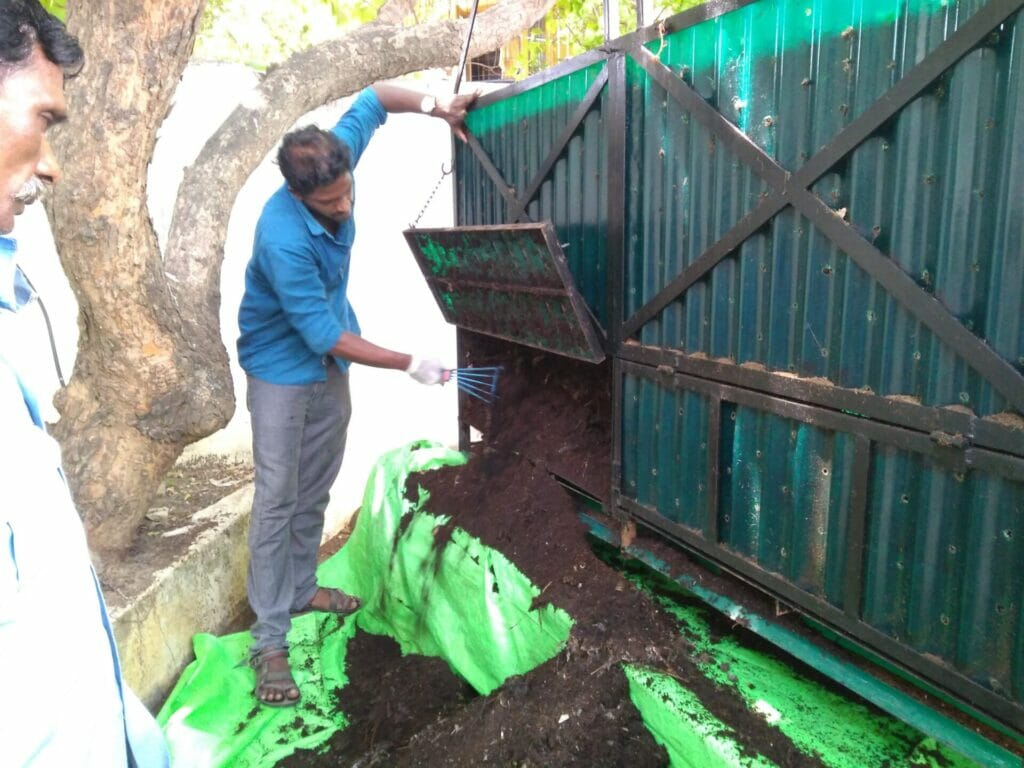Chennai’s decentralised waste management system has been designed with the aim of reducing the quantum of waste that reached the landfills in Perungudi and Kodungaiyur. Dumping of unsegregated waste is a serious detriment to this goal.
The mixed solid waste dumped in the dumpyards generates methane, which is one of the greenhouse gases. Methane is 25% more potent than CO2 in trapping heat in the atmosphere.
With the looming effects of climate change, every stakeholder in the process must participate in managing their waste effectively. This includes the city’s many large apartment complexes and gated communities that have been deemed Bulk Waste Generators (BWGs)
According to the Solid Waste Management Rules in force, apartments, gated communities, marriage halls and large commercial spaces that generate more than 100kgs of waste a day are generators of bulk waste.
BWGs are mandated to deal with their own waste by engaging an empanelled vendor and also setting up facilities in-house wherever possible for processing their waste.
Read more: Residential bulk waste generators flout SWM rules in Chennai
How can BWGs process their waste?
One of the serious problems faced by gated communities and large apartment complexes is figuring out how to deal with the waste generated by them.
Engaging empanelled vendors is one way for the residential BWGs to process their waste. In the absence of space in the premises these BWGs can hand over your waste to an external agency to process the waste.
But sending out the waste is monetarily expensive and involves many logistical hurdles. Managing waste in-house is both cost-effective and efficient.
Setting up in-situ composting facilities and space to segregate plastic waste is the first step. For an apartment complex with an average of 50 residential units, the space required to set up in-house composting facilities would be 200 sq. feet.
In order to help create the necessary infrastructure and set up the processes, residential BWGs can hire any organisation that offers Solid Waste Management as a service. There is no need to hire a consultant if BWGs can find an organisation that offers a comprehensive solution.
These organisations can also help sensitise residents in source segregation by sharing the requisite resources and conducting demonstrations.
As far as manpower is concerned, for 50 units, at least 4-5 part-time workers will be required to work for 2-3 hours a day, right from collection to processing. The costs for set-up and continued operations will depend on the type of service the BWGs choose to engage.
The entire process from setting up composting and segregation facilities and streamlining the collection will take anywhere between three to six months.
Once in place, residents can send plastic waste for recycling and put to use the compost generated from the wet waste.
Domestic hazardous waste must be handed over separately for disposal.

Challenges faced by BWGs in setting up in-house facilities
Some of the key issues that prevent BWGs from setting up waste management facilities in-house include the choice of vendors and cooperation from residents.
BWGs find it difficult to choose the right vendor to set up the in-house SWM infrastructure. Once established, the BWGs may also have problems with the vendors that may prevent continuous operations.
Another key factor is the behaviour of the residents. Residents may be opposed to the idea of in-house facilities for waste management citing aesthetics or apprehensions around hygiene. Residents may also not cooperate with vendors in proper source segregation. Low rates of segregation will throw the entire process in jeopardy.
Fixing a budget for waste management is also another point of contention among residents.
SWM projects are viewed with an eye on l return on investment, which tends to be low.
Finding and training manpower to carry out the work is another challenge that BWGs may face in the process. The process also requires oversight by residents who double up as volunteers. If there are not enough residents taking an active interest, the set-up might run into issues.
Read more: Lessons from residents’ efforts to remove bins in Valmiki Nagar in Chennai
What residents must consider
Residentials BWGs must stop viewing SWM as a project where you will get an ROI. SWM is an expense, not an investment. Residents must view the expense akin to paying water or sewerage tax and not as a means to see returns.
Due respect must be accorded to the process and the effort required to keep it functional. Awareness among residents and RWA office-bearers are key in identifying the right vendors. Visiting the facilities of the vendors and other projects might help the residents make an informed choice.
BWGs must also ensure that they tie up with a vendor who can offer an Annual Maintenance Contract so they will receive continuous support even after the initial setup.
A comprehensive budget for setting up the facilities must be drawn up to understand the scope for reducing costs. The cost of maintenance must be excluded from the set-up cost and collected as a user fee from residents. After a year into the project, the operational expense can be added to the maintenance.
A strong team must be put in place to oversee the project, with enough people to share the responsibilities. The project cannot be dependent on one or two people.
Above all, the money you are spending and the efforts put into setting up an in-house SWM infrastructure is an investment for future generations to come. The biggest return on investment is getting clean air to breathe and a healthy environment to live in.